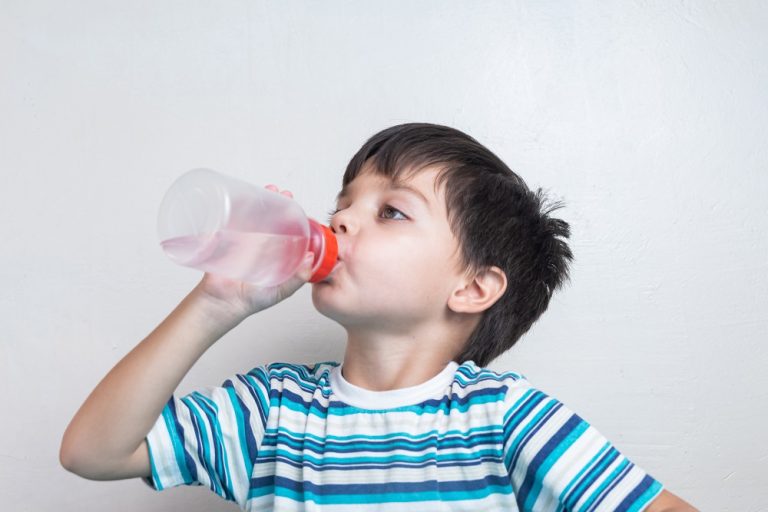Kidney stones are a common health issue that can affect people of all ages, even including children and teens. Kidney stones are not common in children, but the number of children affected has grown steadily larger during the last several years. Changing eating habits may be responsible, especially the rise in the amount of sodium children eat through processed foods and table salt. The rise in obesity and less active lifestyles may also cause more children to have kidney stones.

Children of all ages can develop kidney stones, including infants, but they occur much more often in teens. A family history of kidney stones makes a child more likely to develop them. Children who’ve had kidney stones in the past have a greater chance of developing another kidney stone.
An unhealthy lifestyle and diet can make children more likely to have kidney stones. For example, drinking too little water or drinking the wrong types of liquid, such as sugary soft drinks or drinks with caffeine, may cause substances in the urine to become too concentrated.
Likewise, too much sodium as mentioned above, a part of salt, may force extra minerals into the urine, which can become kidney stones. Unhealthy amounts of sodium are found in many prepared foods, including restaurant meals, chips, sandwich meats, frozen foods, and some sports drinks.
Children are more likely to develop kidney stones if they have certain conditions, including:
- A blockage in or abnormal shape of the urinary tract
- Chronic, or long-lasting, inflammation of the bowel
- Cystic fibrosis NIH external link
- Cystic kidney diseases NIH external link, which are disorders that cause fluid-filled sacs to form on the kidneys.
- Cystinuria
- Digestive problems or a history of gastrointestinal tract surgery
- Gout, a disorder that causes painful swelling of the joints.
- Hypercalciuria, a condition that runs in families in which urine contains unusually large amounts of calcium; this is the most common condition found in people who form calcium stones.
- Hyperoxaluria, a condition in which urine contains unusually large amounts of oxalate.
- Hyperparathyroidism, a condition in which the parathyroid glands NIH external link release too much parathyroid hormone, causing extra calcium in the blood.
- Hyperuricosuria, a disorder in which too much uric acid is in the urine.
- Obesity
- Repeated urinary tract infections (UTIs)
- Renal tubular acidosis, a disease that occurs when the kidneys fail to remove acids into the urine, which causes a person’s blood to remain too acidic.
- Children who take certain medicines. Children are more likely to develop kidney stones when taking the following medicines or medicinal diets over a long period of time:
- Diuretics, often called water pills, which help rid the body of water.
- Calcium-based antacids
- Too much vitamin D
- Indinavir NIH external link and other protease inhibitors used to treat HIV infection NIH external link.
- Topiramate NIH external link and zonisamide NIH external link, medicines used for seizures and migraine headaches.
- A ketogenic diet, which is used for seizure disorders that do not respond to medicine.
In children, calcium stones are most common. The approximate frequency of kidney stone types in the pediatric age group is calcium with phosphate or oxalate (57%), struvite (24%), uric acid (8%), cystine (6%), endemic (2%), mixed (2%), and other types (1%)These small, hard deposits of minerals and salts form in the kidneys and can cause severe pain and discomfort when they become too large to pass through the urinary tract. In this blog post, we will discuss the causes, symptoms, and prevention of kidney stones in children and teens.
One of the main causes of kidney stones in children and teens is a lack of fluids in the body. When children and teens do not drink enough water, their urine becomes concentrated, which can lead to the formation of kidney stones. Dehydration, due to prolonged physical activity, or not being in a habit of drinking enough water can increase the risk of developing kidney stones.
Small Kidney Stone Symptoms
When it comes to the signs and symptoms of kidney stones in children and teens, they may experience some or all of the following:
- Severe pain in the back, side, lower abdomen, or groin
- Blood in the urine
- Nausea and vomiting
- Frequent urination or a burning sensation when urinating
- Fever and chills
If you suspect that your child or teenager has a kidney stone, it’s important to seek medical attention immediately. Your healthcare provider will likely order imaging tests, such as a CT scan or an ultrasound, to confirm the presence of a kidney stone and determine its size and location.

To prevent kidney stones from forming in children and teens, it’s important to encourage them to stay hydrated by drinking plenty of water and other fluids. Aim for at least eight cups of water per day and make sure they are taking enough water, especially if they are engaged in any physical activity. Parents should also encourage children and teens to eat a healthy diet that is low in salt and animal protein and high in fruits and vegetables.
If your child or teenager already had a kidney stone, your healthcare provider may recommend lifestyle changes and medications to help prevent another one from forming. In some cases, your healthcare provider may recommend a low-oxalate diet. Some medications that can help prevent kidney stones include potassium citrate, which can help to neutralize the acid in urine, and allopurinol, which is used to treat gout and can help to prevent the formation of uric acid kidney stones.
If your child or teenager is passing a kidney stone, your healthcare provider may recommend taking over-the-counter pain medication, such as ibuprofen, to help manage the pain. Drinking plenty of water can also help to flush the kidney stone out of the body.
It’s important to note that if a child or teenager has recurrent kidney stones, your healthcare provider may recommend additional testing and treatments to find the underlying cause of their condition. In some cases, surgery may be necessary to remove.

A Quick Guide On Size And Passing Of Kidney Stones
Kidney stones are chronic diseases and have many types. Read further on how long to pass kidney stones of all types & its preventions!
